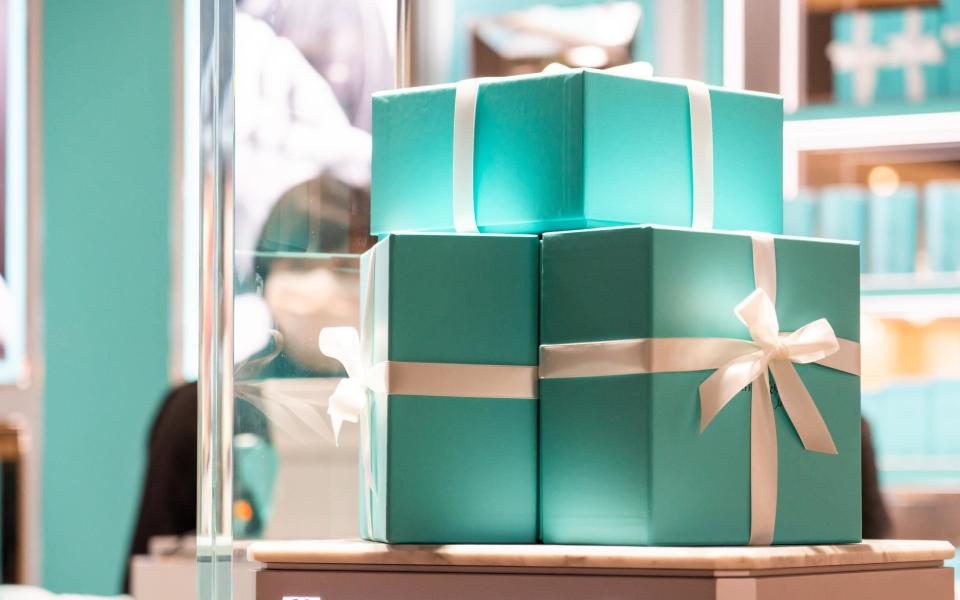Why middle-class generosity is fashion's last hope for lockdown Christmas success

From hoarding loo roll to breaking quarantine, the pandemic hasn’t always brought out the best in us. But when it comes to shopping it clearly has – at least according to retailers, who have noticed huge spikes in gift-giving over the last few months as we choose to spend money on friends and family rather than ourselves.
Fashion platform LovetheSales.com, which analyses the data of six million UK shoppers across 1,000 retailers, has noticed a 24 percent rise in gift-giving compared with this time last year – and a 52 percent increase in customers opting to buy personalised jewellery than they were at the same time in 2019. Notonthehighstreet.com has observed a similar pattern, with more users than ever ordering goods to be gift-wrapped and delivered elsewhere.
The reasons for this spike in present-buying are varied, but we can assume they are largely as a result of families being kept apart through major life events like birthdays, christenings and engagements – and instead of celebrating in person, buying personalised presents to show they care. Milestones that might previously have been marked by a trip abroad, a party or even a dinner out are now being celebrated with jewellery and watches.
A post shared by & Other Stories (@andotherstories) on Oct 28, 2020 at 10:53am PDT
“It makes sense. Middle-class people with jobs actually have a higher disposable income now than they did before the pandemic,” says Andrew Phipps, a retail expert. “They aren’t spending their money on travel or other pursuits in the way they might have done in the past, so in many ways they are a waiting market - the key for retailers is finding goods worth buying when people are just at home. A party dress is pointless, but a personalised gift for a family member you haven’t seen in months isn’t – and it makes you feel good at a time when there isn’t much to feel good about.”
As a result, the retailers now pinning their hopes on the fact gifting will get them through a difficult Christmas. The industry is rightly terrified by a second lockdown, as shops being closed over November and December could be the death-knell in an already challenging year. But even if the fears of a cancelled, socially distant Christmas come true, people will still want and need to buy presents for the people they are not allowed to see.
A post shared by OLIVIA von HALLE (@oliviavonhalle) on Sep 1, 2020 at 11:00am PDT
“There is the well-documented happiness factor that comes from gift-giving,” says Peter Mace, a partner at Cushman & Wakefield specialising in luxury retail. “It’s the whole, ‘you can’t see them but you’ll treat them’ way of thinking that is already leading to a good amount of sales and we’re not even at Christmas yet. It’s a real bright spot for the industry, although there is the worry that upcoming redundancies will shift this pattern.”
At present, however, there is no sign of this trend abating. As a result, brands like & Other Stories and Next have expanded their gift-giving ranges, while retailers across the board are offering gift-wrapping online.
Some products are, of course, more suitable to give as a present than others. Lingerie sales have increased as a result of this trend, as have sales for brands such as Olivia Von Halle, which specialise in luxury silk pyjamas that can be customised with initials. Anything that can be personalised is doing well, but it is demi-fine jewellery brands in particular that have had a bumper year, particularly when it comes to pieces around the £100 mark.
Otiumberg, a London-based brand specialising in affordable gold and silver jewellery have had a hugely lucrative six months with sales way up compared to 2019. “There has been a huge uptick in personalisation, whether that’s our name bracelets, initial pendants or engraving items,” says co-founder Christie Wollenberg. “From feedback we’ve had from customers during our online showroom appointments, they are wanting to send meaningful gifts to loved ones at a time when they haven’t been able to be in physical contact with them.
Names worthy of gold. Choose from solid gold, vermeil or sterling silver.
A post shared by Otiumberg (@otiumberg) on Jul 14, 2020 at 9:01am PDT
“We’ve also seen an increase in demand for our solid gold jewellery,” she adds, “undoubtedly because people are willing to invest little more, especially when it comes to gifting, to ensure the longevity of the piece.” In response to this, the brand launched a new collection this week, called Ensemble, which includes diamond-encrusted designs and sells at a higher price point than other goods.
In a similar phenomenon, sales of watches are also up. “People are not spending on any of the usual luxuries so instead are making one-off special purchases for themselves and the people around them,” says Mace. “Watches really have seen amazingly good results this year and it will only get better as we get closer to Christmas.”
But with the threat of a second lockdown on the horizon, it seems unlikely that shopping streets around the country will see anywhere near as much footfall as usual this December, meaning that we will need delivery services able to cope with the uptick in gift-buying expected over the next two months.
“It’s a real worry, as we’re simply not equipped for a Christmas of goods bought entirely online,” says Phipps, “and if it’s not sorted out, we could see delivery times of up to two weeks by December. Which would be a shame as nobody wants to be generous only for Christmas presents to arrive in January.”
For more news, analysis and advice from The Telegraph's fashion desk, click here to sign up to get our weekly newsletter, straight to your inbox every Friday. Follow our Instagram @Telegraphfashion

 Yahoo News
Yahoo News 